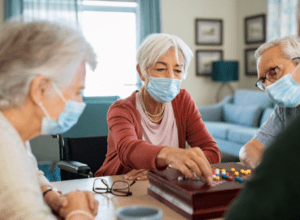Running a Successful RCFE in a Post-Pandemic World
As the world slowly recovers from the pandemic, many industries, including residential care facilities for the elderly (RCFEs), have had to adapt to new protocols and guidelines to ensure the safety of their residents and staff. Assisted living administrators are the first line of defense in ensuring protective protocols are applied to RCFE facilities.
Over the course of the COVID-19 pandemic, RCFE residents have been heavily impacted by the virus. In Los Angeles County, for example, almost four times as many RCFE residents have tested positive compared to RCFE staff.
The elderly are especially vulnerable to the COVID-19 virus. The nature of facilities with large numbers of individuals living close to each other contributes to the vulnerability of residents.
Compared to staff, this high ratio of infected residents highlights residents’ vulnerability within the RCFE ecosystem. Staying on top of post-pandemic protocols will help you keep your RCFE as safe as possible.
In California, the Department of Social Services (DSS) has released updated guidelines and protocols for RCFEs in response to the pandemic.
Ensuring your RCFE remains up to date on the latest protocols will help you protect your clients and your staff, as well as keep your RCFE up to code. Need help keeping your staff informed? Contact us.
In this article, we will discuss these post-pandemic protocols for RCFEs in California.
Screening of Residents and Staff
One of the most important protocols is screening residents and staff for COVID-19 symptoms. RCFEs must screen all staff and residents daily for symptoms of COVID-19, including fever, cough, and difficulty breathing. Daily screening is not required for visitors.
This protocol includes screening for potential exposure to COVID-19, such as contact with someone who has tested positive for the virus. Any staff or residents who exhibit symptoms or have been exposed to the virus must be isolated and tested immediately.
Screening can be done passively. This can be accomplished by:
- Posting signs at RCFE entrance points to remind people to self-screen and not to visit the RCFE if they have been exposed to COVID-19 or are experiencing any symptoms.
- Exclude any visitors from entering who display COVID-19 symptoms.
- Educating visitors on methods of self-screening before entering the facility
- Sending information about COVID-19 self-screening information, including symptoms.
Notably, diagnostic testing is not required. This is also the case for workers exempt from vaccination for specific medical reasons or personal religious beliefs. Also, if it is decided to make testing mandatory at a given RCFE, testing must include all workers, even if they are already vaccinated.
Diagnostic testing is required for staff who have been in close contact with someone who was COVID-19 positive while infectious. This close contact is defined as being within six feet continuously for at least 15 minutes during a 24-hour period.
How Long Do People Stay Contagious?
Different illnesses present different time windows where infected individuals may be contagious. Staying aware of these time windows will help protect everyone located at your RCFE:
- COVID-19: 8-10 days (on average). The only way to know for certain if an individual is still contagious is through testing. A positive test tells you someone is still contagious, regardless of how long they have been sick.
- Flu: 5-7 days
- RSV (respiratory syncytial virus): 3-8 days
Vaccination Requirements and Recommendations
Vaccination is also an essential component of post-pandemic protocols for RCFEs in California. The state requires all staff to be vaccinated against COVID-19 (except for those with medical or religious exemptions). Staff must have had their primary series vaccination and one booster.
While it is strongly encouraged, it is not required for staff to be fully up to date on boosters. Additionally, residents are not required to be vaccinated, although it is also encouraged.
Personal Protective Equipment (PPE)
Another important protocol is the use of personal protective equipment (PPE). RCFEs must ensure that staff have access to PPE, such as masks, gloves, and face shields, as appropriate.
Additionally, as an RCFE administrator, it is important to establish workplace safety for your RCFE by ensuring staff receive training on the proper use of PPE and that PPE is properly disposed of after use.
Masking requirements serve as an important layer of protection. For visitors and staff:
- Must wear when in indoor settings (unless eating or drinking)
- Required when located with residents who are in isolation
- Encouraged (but not required) in outdoor settings
- Mask requirements do not change due to vaccination status
- The most effective masks are the N95, KN95, or KF94
Cleaning and Disinfecting
RCFE administrators need to ensure their facilities adhere to strict cleaning and disinfecting protocols. High-touch surfaces, such as doorknobs, light switches, and handrails, must be cleaned and disinfected regularly.
Additionally, common areas, such as dining rooms and lounges, must also be cleaned and disinfected regularly. RCFEs must ensure that all equipment and relevant supplies, such as blood pressure cuffs, are cleaned and disinfected each time they are used.
When a client has a communicable disease, areas the client may have impacted must be cleaned and disinfected. Additionally, proper cleaning should occur after personal contact with a client who has a communicable disease.
Social Distancing
Social distancing is another valuable protocol for RCFEs. Facilities should consider distancing between persons to enable individuals to maintain a safe distance from others, both inside and outside the facility for those who are:
- Not vaccinated
- Have not yet received an available booster, and are eligible
- Have an unknown vaccination status
Social distancing should be enabled to the extent it is feasible.
Group activities should be conducted with these recommendations in mind, again to the extent such precautions are feasible. Additionally, staff should be trained on the proper use of social distancing measures and how to communicate the importance of social distancing to residents.
Reporting Requirements
As of March 13, 2023, facilities no longer need to report when a single resident tests positive for COVID-19.
Isolate for 5 Days
The resident that has tested positive needs to self isolate for a minimum of 5 days. The resident may leave isolation only if they have no symptoms or symptoms are mild/improving AND they have had no fever for 24 hrs without the aid of a fever-reducing medication. The person should wear a well-fitting face mask for 10 days.
Leaving Isolation
The person leaving isolation may remove their mask sooner than day 10 if they have no symptoms or symptoms are mild or improving and they are fever free without the use of a fever-reducing medication. They also need 2 sequential negative tests one day apart.
Reporting
If 3 or more residents are positive for COVID-19, then reporting to the appropriate authorities for an outbreak must still occur.
These reporting requirements help to track the spread of the virus and ensure that appropriate measures are taken to prevent further transmission.
Training and Education
Finally, RCFEs must ensure that staff receive training and education on COVID-19 protocols and procedures.
Staff should be trained on the proper use of PPE, cleaning and disinfecting protocols, social distancing measures, and how to screen residents and staff for symptoms of COVID-19. Knowledge of the most recent training requirements will be necessary to obtain your RCFE licensure.
Additionally, RCFE administrators must ensure ongoing education and training are provided to staff as new information and guidelines become available. Ongoing education efforts are important to ensure workplace safety for your RCFE.
The Provider Information Notice (PIN) contains additional information regarding COVID-19 policies. Specifically, this PIN notice has further instructions covering new visitation guidance, with related clarifications and other safety information.
California RCFEs are required to subscribe to an RCFE regulation update service.
Pandemic Protocols for Assisted Living Administrators
In conclusion, post-pandemic protocols for RCFEs in California focus on screening residents and staff for COVID-19 symptoms, vaccination, the use of PPE, cleaning and disinfecting, social distancing, reporting requirements, and staff training and education.
These protocols are essential to facilitating the safety and well-being of RCFE residents and staff. By adhering to these protocols, RCFEs can help prevent the further spread of the virus and protect the vulnerable populations residing at RCFEs.
To help stay on top of changing requirements and to keep your licensure requirements current, continuing education RCFE classes are now required to include 20 hours Live and 20 hours online as of March 1, 2023. available online.
Assisted Living Education
If you want to ensure that your facility meets regulatory compliance and provides top-quality care to its residents, then you need to work with an approved vendor who can offer comprehensive RCFE administrator certification courses and staff training.
That’s where Assisted Living Education comes in – we’re here to help you stay up-to-date with the latest regulations, provide ongoing support and consultation services, and make sure that your staff is trained to deliver the best possible care.
Don’t wait to take the next step in improving your facility – contact us today to learn more about how we can help.







